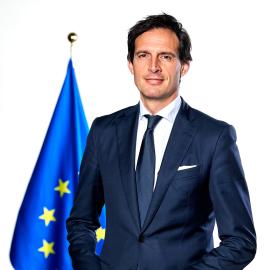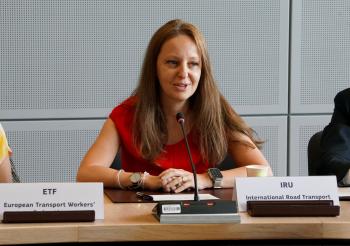IRU joined key EU stakeholders at a high-level Implementation Dialogue on the rollout of the Emissions Trading System 2 (ETS2) and the Social Climate Fund (SCF), cornerstones of the EU’s climate strategy.

The high-level Implementation Dialogue, hosted by European Commissioner Wopke Hoekstra, provided an opportunity to discuss concrete challenges and solutions directly with EU leaders.
IRU welcomed the initiative and expressed appreciation for the European Commission’s engagement, highlighting the importance of continued dialogue and collaborative policymaking to ensure that ETS2 delivers on its goals fairly and effectively.
The discussion focused on translating ETS2 and the SCF into effective action by identifying barriers, opportunities and best practices. IRU emphasised the essential role of commercial road transport in meeting Europe’s environmental objectives and the need for targeted, inclusive measures to support the sector.
IRU EU Advocacy Director Raluca Marian said, “The road transport sector is ready to move forward on climate goals. With the European Commission’s support and guidance to Member States, ETS2 must become more than just another charge on diesel. It must also be a catalyst. We need targeted reinvestment of the collected funds, accessible financing, and clear, practical support for operators, especially smaller ones.”
IRU underlined that reinvesting revenues generated from road transport under ETS2 into the sector could play a key role in supporting fleet renewal with clean vehicles and in developing the necessary infrastructure, such as charging and refuelling stations, to make low- and zero-emission fleets more viable across Europe.
Cautioning against the significant risk of Member States using ETS2 revenues from road transport to cross-subsidise other sectors, as seen with other charges such as the Eurovignette, IRU also reiterated the importance of maintaining sectoral fairness. Ensuring that operators, particularly microenterprises and SMEs, receive practical and tailored support is essential. Microenterprises and SMEs often face the heaviest financial burden with limited ability to shift to zero-emission alternatives without significant external help.
IRU further emphasised that the effectiveness of ETS2 would be strengthened by aligning it with other EU and national policy instruments, such as energy taxation and road charging schemes.

“ETS2 can support road transport decarbonisation, but only if its revenues are transparently and effectively reinvested into the sector,” said Raluca Marian. “Without accessible support for fleet renewal and alternative fuels infrastructure, the additional financial burden will hit small and medium-sized operators the hardest. They have the least flexibility to adapt.”
“It must be part of a broader, coordinated policy mix, not a standalone measure. We urge Member States and the European Commission to ensure that the system delivers on both its climate and fairness objectives,” she added.
IRU is committed to continuing close cooperation with the European Commission, the European Parliament and Member States to ensure that climate policy supports both environmental progress and the economic sustainability of Europe’s road transport sector.
Commissioner Hoekstra’s initiative to launch this dialogue and engage with stakeholders is a positive signal that, with the right cooperation, workable solutions can be found to support a fair and effective transition.
